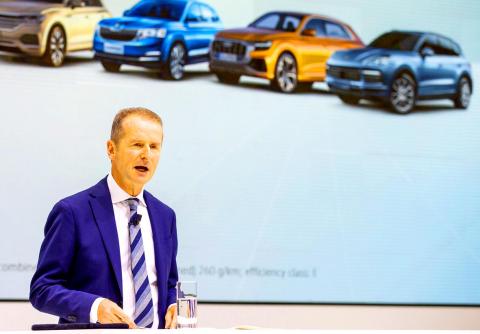Mexican farming communities on Tuesday accused German auto giant Volkswagen AG of “arbitrarily” provoking a drought in the central state of Puebla to protect its newly manufactured cars from hail.
Volkswagen, which has a major plant in Puebla, has been using “hail cannons” — sonic devices that purport to disrupt the formation of hail in the atmosphere — to disperse storm clouds menacing the thousands of new cars parked on its lots.
However, farmers in Cuautlancingo, the rural municipality where the plant is, say the controversial technique is causing a drought that has made them lose 2,000 hectares of crops.

Photo: Bloomberg
Scientists are skeptical over whether hail cannons actually work, but local farmers say the cannons work so well they have dispersed not only hail storms, but all precipitation since May — what was supposed to be the start of the rainy season.
The farmers are reportedly seeking more than 70 million pesos (nearly US$4 million) in compensation from the automaker.
Volkswagen tried to defuse the conflict this week by announcing it was taking the cannons off automatic mode and would only fire them when potential hailstorms approached.
It also pledged to invest in protective mesh to serve as its first line of defense against hail.
However, that only added to the fury of local farmers and officials who have been protesting against the automaker.
“It is unacceptable that they continue using this device, even in manual mode. They are not respecting their neighbors’ request to definitively stop using hail cannons. They are acting arbitrarily,” said Rafael Ramirez, the top local environmental official.
“The company can take other measures to protect its cars, but people here can’t live off anything but their land,” he said.
“Volkswagen claims to be an environmentally friendly company, but they’re not showing it,” he added.
Gerardo Perez, a leader of the protesting farmers, said the hail cannons are “affecting the Earth’s cycles.”
When they emit their sonic booms, “the sky literally clears and it simply doesn’t rain,” he said.
It is not the first environmental controversy for the car maker, which is still dealing with the fallout of an emissions cheating scandal that erupted in 2015.
Volkswagen Mexico officials did not immediately answer requests for comment. The company has responded in the past that it has all necessary permits from Puebla state officials to operate the devices.
Volkswagen launched operations in Mexico in 1965.
The Puebla plant is its largest in the world outside Germany.
It produces more than 450,000 vehicles a year and operates around the clock, employing about 15,000 people.

Taiwan Semiconductor Manufacturing Co (TSMC, 台積電) last week recorded an increase in the number of shareholders to the highest in almost eight months, despite its share price falling 3.38 percent from the previous week, Taiwan Stock Exchange data released on Saturday showed. As of Friday, TSMC had 1.88 million shareholders, the most since the week of April 25 and an increase of 31,870 from the previous week, the data showed. The number of shareholders jumped despite a drop of NT$50 (US$1.59), or 3.38 percent, in TSMC’s share price from a week earlier to NT$1,430, as investors took profits from their earlier gains

In a high-security Shenzhen laboratory, Chinese scientists have built what Washington has spent years trying to prevent: a prototype of a machine capable of producing the cutting-edge semiconductor chips that power artificial intelligence (AI), smartphones and weapons central to Western military dominance, Reuters has learned. Completed early this year and undergoing testing, the prototype fills nearly an entire factory floor. It was built by a team of former engineers from Dutch semiconductor giant ASML who reverse-engineered the company’s extreme ultraviolet lithography (EUV) machines, according to two people with knowledge of the project. EUV machines sit at the heart of a technological Cold

Taiwan’s long-term economic competitiveness will hinge not only on national champions like Taiwan Semiconductor Manufacturing Co. (TSMC, 台積電) but also on the widespread adoption of artificial intelligence (AI) and other emerging technologies, a US-based scholar has said. At a lecture in Taipei on Tuesday, Jeffrey Ding, assistant professor of political science at the George Washington University and author of "Technology and the Rise of Great Powers," argued that historical experience shows that general-purpose technologies (GPTs) — such as electricity, computers and now AI — shape long-term economic advantages through their diffusion across the broader economy. "What really matters is not who pioneers

TAIWAN VALUE CHAIN: Foxtron is to fully own Luxgen following the transaction and it plans to launch a new electric model, the Foxtron Bria, in Taiwan next year Yulon Motor Co (裕隆汽車) yesterday said that its board of directors approved the disposal of its electric vehicle (EV) unit, Luxgen Motor Co (納智捷汽車), to Foxtron Vehicle Technologies Co (鴻華先進) for NT$787.6 million (US$24.98 million). Foxtron, a half-half joint venture between Yulon affiliate Hua-Chuang Automobile Information Technical Center Co (華創車電) and Hon Hai Precision Industry Co (鴻海精密), expects to wrap up the deal in the first quarter of next year. Foxtron would fully own Luxgen following the transaction, including five car distributing companies, outlets and all employees. The deal is subject to the approval of the Fair Trade Commission, Foxtron said. “Foxtron will be